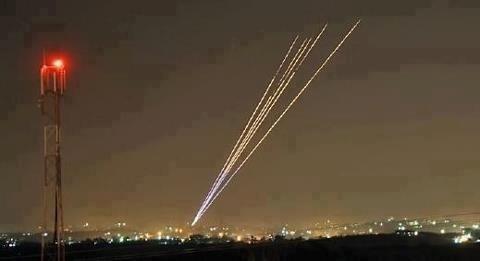Syria threatened retaliation against Israel after an aerial strike on the outskirts of caused explosions that rocked the capital, increasing the risk of a wider regional conflict.
An Iron Dome short-range missile defence system stands near the northern Israeli city of Haifa on May 5, 2013. Syria deployed rocket batteries directed toward Israel, the pro-government Damas Post website said, and the Israeli army said two Iron Dome missile defense batteries were deployed in the north. Photographer: Ahmad Gharabli/AFP/Getty Images
Israel didn’t confirm involvement in the assault yesterday. Its military also carried out an airstrike in Syria on May 3, The Associated Press reported, citing unidentified Israeli officials who said the attack targeted a shipment of missiles thought to be bound for Hezbollah militants in Lebanon.
Syria’s Deputy Foreign Minister Fayssal Mekdad told CNN the airstrikes were a “declaration of war” and that the government would retaliate in its own time. Information Minister Omran al- Zoubi said on state TV that Syria would use “any means” to protect its people. He said the overnight strike hit a military research center in Jamraya, northwest of Damascus. Syria deployed rocket batteries directed toward Israel, the pro- government Damas Post website said.
Israeli officials say Syria’s two-year-old civil war has increased the threat that Hezbollah or other militant groups will obtain weapons from the country and turn them on Israel. The Jewish state has repeatedly clashed with Hezbollah, an Iranian-backed organization classified as terrorist by Israel and the U.S., though there has been little conflict between them since Israel’s most recent invasion of Lebanon in 2006.
Rocket Batteries
Israeli Prime Minister Benjamin Netanyahu didn’t address the attacks in opening remarks to his weekly Cabinet session yesterday. The Israeli leader did delay a scheduled trip toChina for at least two hours to convene his inner security Cabinet. The Israeli army said two Iron Dome missile defense batteries were stationed in the north.
President Bashar al-Assad’s government is fighting a rebel movement backed by the U.S. and most European and Arab countries that has gained control in several parts of the country. Hezbollah and Iran are supporting Assad in the conflict.
The attacks had little impact on Israel financial markets. The benchmark stock index, which fell 0.1 percent yesterday, was little changed as of 10:40 a.m. today. While benchmark bond prices fell yesterday, that was largely driven by a cut in Israel’s credit rating at Standard & Poor’s.
‘Calculated Risk’
Jonathan Spyer, a political scientist at the , Israel, said the Jewish state was betting it could strike because Syrian President Bashar al-Assad is too mired in his own civil war to carry out the threatened reprisals.
“Israel is taking a calculated risk that Assad, Iran and Hezbollah are right now fighting a war against the Syrian rebels and probably don’t want to open up a second front against a far more formidable enemy,” Spyer said by telephone. “If Israel has now done this twice with air strikes within the last 48 hours, its ‘shadow conflict’ with Iran is no longer in the shadows.”
Israel has threatened military strikes on Iran to curb its nuclear program before it becomes capable of making atomic bombs, if diplomatic efforts backed by the U.S. to achieve the same end aren’t successful. Israeli officials say Hezbollah has multiplied its weapons stocks since 2006 and obtained more sophisticated missiles with a greater range.
‘more
“Russia Today”: Israeli bombardment on Damascus, killing more than 300 Syrian soldiers
Syrian sources said local site “Russia Today”, who asked not to be identified, said the Israeli bombardment targeted two brigades, 104 and 105 officers of the Republican Guard and deployed in areas Jmraiya and Kudsia and important patient in Damascus.
Also targeted bombing, which occurred on Sunday May 5 ammunition depot belonging to the band 14 in the same area, as well as targeting the center of research in Jmraiya.
The source said it had killed nearly 300 people, mostly soldiers, and the number of wounded Distributors in sympathy hospitals and 601 military and university-Assad, as well as the in industrious Hospital.
This did not issue any official statement yet about what happened and the number of victims, as we could not verify the validity of this information from any Syrian official source.







